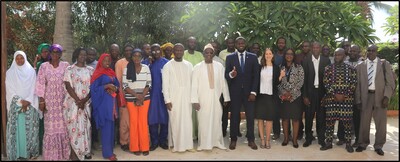FAO and its partners present the results of the KnoWat project in Senegal
26 November 2022, Dakar – About fifty stakeholders –representatives of the State's technical services, civil society actors and producers' organizations, academy, private sector and technical and financial partners– participated in the final national workshop of FAO's KnoWat project in Senegal.
For three years, FAO and its national partners in Senegal have implemented the project "Knowing Water Better: Towards a more equitable and sustainable access to natural resources for greater food security" (KnoWat).
Around the world, countries are struggling to adapt their agricultural and food systems to the conditions of water scarcity, climate change and increased competition among natural resource users. According to current trends and projections, water scarcity is expected to increase, which could unfortunately lead to tensions and conflicts between different actors.
Mr Makhfousse Sarr, Assistant to the FAO Representative in Senegal, participated to the event and spoke on behalf of Mr Gouantoueu Robert Guei, FAO Subregional Coordinator for West Africa and FAO Representative in Senegal. He emphasized the importance of the KnoWat project for the country. According to him, "the KnoWat project has been operational in Senegal since July 2019 and has directly benefited several hundred people both at the national and local level in the Delta and the Middle Valley of the Senegal River. In addition, he says that the results obtained by this project will help inform Senegal's political and strategic decisions on water governance.
"To respond to current challenges related to climate change, water scarcity, population growth, and to produce knowledge to inform decision makers now and in the future, FAO –with the financial support of the German Federal Government,– has implemented the KnoWat project. The project has helped not only agricultural producers but also all partner institutions to better understand water," said Mr Sarr.
Mr Ousmane Ly, Agropastoralist and Administrator of the National Council for Consultation and Cooperation of Rural People of Senegal (CNCR) mentioned the satisfaction of the rural actors involved throughout the implementation of the KnoWat project in Senegal.
According to Mr Ly, "farmers' organizations have played an important role in the implementation of the KnoWat project in Senegal. This project has helped training and raising awareness among herders, farmers and fishermen on the rational use of water, and especially to initiate the establishment of local platforms on governance and water tenure in the Delta and the Middle Valley of the Senegal River.
The workshop was chaired by Mr Khaly Fall, Director of Development and Support to Local Authorities of Société d'Aménagement et d'Exploitation des Terres du Delta du Fleuve Sénégal (SAED), on behalf of the Minister of Agriculture, Rural Equipment and Food Sovereignty (MAERSA), His Excellency Mr Aly Ngouille Ndiaye.
Mr Fall thanked FAO and its partners, including the Federal Government of Germany, for the choice of Senegal for the implementation of this project, but also for the results obtained after three years of work.
"The problem in Senegal and worldwide is that we often do not know how much water is available and how much is actually consumed, especially in rural areas and in agriculture, which consumes the most water. Thus, institutions in charge of water management often work without real data and evidence to inform decision-making. To address these challenges and protect all water rights, it is necessary to strengthen the availability, accessibility and use of reliable information on water resources. The KnoWat project has contributed to this process in Senegal and we are pleased with the inclusive, multi-stakeholder approach that has been adopted by the Senegal team."
Mr Fall emphasized that the closing of such a project should be the beginning of a new scaling up process and that the Ministry of Agriculture, Rural Equipment and Food Sovereignty and the whole government of Senegal are ready to accompany FAO and its partners for a new large-scale project on water governance, given its decisive and cross-cutting aspect for all development sectors of the country.
The National Coordinator of the KnoWat project in Senegal, Mr Lamine Samaké, was interviewed regarding the project implementation and results. He welcomed and congratulated the fruitful partnership between FAO and the Government of Senegal, and also with all other stakeholders involved in the implementation of the project.





